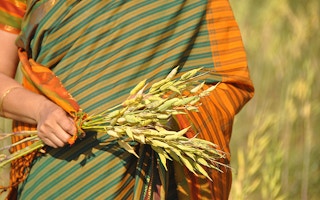Two United Nations (UN) agencies have teamed up to launch a new policy on sustainable agriculture - a crucial but often over-looked element in a low-carbon economy.
The United Nations Environment Programme (UNEP) executive director Achim Steiner and the International Fund for Agricultural Development (IFAD) president Kanayo Nwanze issued a statement Wednesday recognising the vital role of sustainable agriculture, and particularly smallholder farmers, in developing a green economy.
The statement called for the world’s governments to scale up policies and investments to aid and protect farmers and natural resources at the same time.
“Agriculture is at the centre of a transition to a resource-efficient, low-carbon green economy. The challenge is to feed a growing global population without pushing humanity’s footprint beyond planetary boundaries,” said Mr Steiner.
The global population is expected to surpass nine billion people by 2050. At the same time, scientists are predicting decreased crop yields due to global warming. A study released today by international research NGO the Consultative Group on International Agricultural Research (CGIAR) found that over the next 40 years, over 369 million people - particularly those in India, China and sub-Saharan Africa living in primarily agricultural regions - will suffer significant impacts from shorter growing seasons and temperatures that exceed the threshholds of staple crops.
The world’s rural poor will be the main victims of the resulting food shortages and price increases. According to IFAD, with one billion of the world’s most impoverished living in rural areas, the rural poor constitute the largest share of the earth’s undernourished people.
But this same group of people holds the key to feeding the growing global population. With 80 per cent of the developing world’s rural dwellers involved in agriculture, smallholder farmers account for 60 per cent of global food production. In Asia and sub-Saharan Africa, 80 per cent of food consumed is grown by smallholders.
IFAD and UNEP argue that focusing aid and investment on the 500 million smallholdings interspersed throughout developing countries will address poverty and natural resource issues at the same time.
Mr Nwanze noted that smallholders in developing countries – the majority of them women – manage to feed two billion people despite working on ecologically and climatically precarious land. This group has little access to infrastructure and institutional services, and often lack the land tenure rights that farmers in developed countries take for granted, he added.
“Right now, we are squandering the potential of rural poor people to contribute to global prosperity. Investing in sustainable smallholder agriculture is a smart way to right this wrong,” said Mr Nwanze.
UNEP’s Mr Steiner said that official development assistance (ODA) – estimated at US$8 billion in 2010 - is not enough on its own, and that governments needed policies to encourage private investment in smallholder agriculture.
Such policies would involve institutional reforms, investments in infrastructure, improvements in market access and improved communication with the women and men operating the smallholder farms.
Women, in particular have received growing international attention for their role in agriculture. A recent report by the United Nations’ Food and Agriculture Organization (FAO) found that women farmers have less access to financial and other resources than their male counterparts, resulting in crop yields for women that are 20 to 30 per cent lower than for men. Closing this gap would result in a 12 to 17 per cent reduction in the number of undernourished people globally, noted the report.
The joint partnership, entitled the Environment and Natural Resource Management (ENRM) Policy, will combine existing efforts to address poverty and food security with larger environmental issues such as climate change. Agriculture contributes more than 30 per cent of global greenhouse gas emissions, largely due to forest clearing for arable land.
Well-managed agriculture can not only overcome hunger and poverty, but can address other challenges from climate change to the loss of biodiversity, said Mr Steiner. “Its contribution to multiple economic, environmental and societal goals needs to be recognized in the income and employment prospects for the half a million smallholdings across the globe,” Mr Steiner added.
IFAD’s director of environment and climate, Elwyn Grainger-Jones, said the new policy would provide developing country governments already using IFAD resources better support to help them achieve their social development and environmental goals.
“Too often policymakers think they have to choose between feeding people and protecting the environment. That is a false choice. We have to, and can, do both,” she added.








